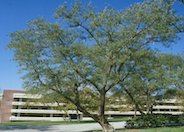
Common name:Olive, European Olive
Botanical name:Olea europaea
This broad tree will grow to 40' tall and has small, gray green leaves with fleshy black fruit that appears in fall.
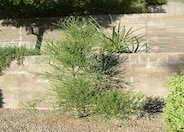
Common name:Pencil Tree, Pencilbush, Milkbush
Botanical name:Euphorbia tirucalli
In frost free areas, Euphorbia can become a 30' tree but in colder areas, it is often knocked back by frost. It can be single or multiple trunked. It has green cylindrical branches that are about the diameter of a pencil. Leaves are not usually present. Some people are allergic to the sap. It is tolerant of salt, full sun, part shade and quite drought resistant. It is a great accent plant for a container. This form has light green branches if in full sun.
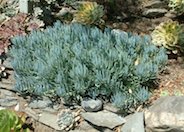
Common name:Kleinia
Botanical name:Senecio mandraliscae
This succulent perennial will grow to about 1.5' tall and 2' wide. It has curved, bluish gray leaves that are about 3.5" long and very slender.
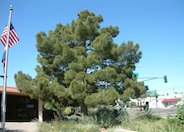
Common name:Allepo Pine
Botanical name:Pinus halepensis
The Pinus halepensis exhibits moderate growth to 30' or more, with an open, irregular crown. The long needles are doubled and light green in color, with a length of 2.5"- 4" long. Pines are highly combustible plants.
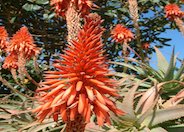
Common name:Tree Aloe
Botanical name:Aloe arborescens
This succulent is large, full of branches and produces deep red orange blooms in fall and winter. The flowers produce a nectar that is attractive to many different birds; this plant is grown all over the world. This succulent can reach 8' tall and 5' wide. Leaves are narrow, recurved and tooth margined and can be green or yellowish or blue green, depending on how much sun it receives. It tolerates sun or shade.
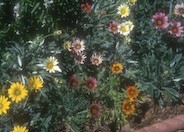
Common name:Hybrid Gazanias
Botanical name:Gazania hybrids
These ground covers will grow less than 1' tall and have medium size, gray green leaves with gold, lavender, orange, red, yellow, or white flowers that are present all year.
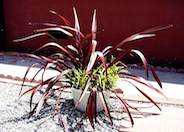
Common name:Dazzler Flax
Botanical name:Phormium 'Dazzler'
Dazzler Flax is a New Zealand flax with striped maroon and scarlet leaves from 3'-6' in height.
| Designer: Stephanie Blanc | California Greek Garden 2 |
Photographer: GardenSoft |
Soils and Compost:
Incorporate compost 6" into your soil to retain water, reduce compaction, feed earthworms, and provide valuable nutrients to your plants.
Water Saving Tip:
Integrated Pest Management:
Attract, or buy beneficial insects such as ladybugs and lacewings to control pest outbreaks in your garden.
